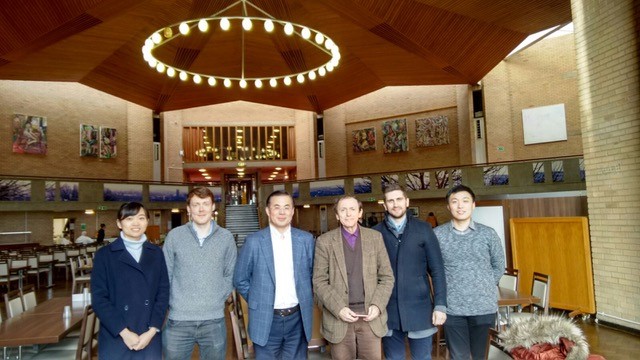In January 2017, a research team from the Applied Optics Group (AOG) in the School of Physical Sciences (SPS) met with colleagues from Imperial College’s Hamlyn Centre for Robotic Surgery to review progress on ‘REBOT – Robotic Endobronchial Optical Tomography’. This joint Kent-Imperial project, which is supported by a grant of over £1.2 million from the Engineering and Physical Sciences Research Council, aims to help tackle poor survival rates in lung cancer. As it stands, only around 10% of those diagnosed with the disease will survive more than five years, a statistic that has changed little in the last half century.
Part of the solution lies in earlier diagnosis, but even when suspicious nodules (potential tumours) are identified in CT images, they often lie deep within the lungs, making them difficult to access for traditional biopsy. The REBOT project is exploring the idea of a tethered robot that will enter the lung through the mouth, just like a normal bronchoscope camera. Unlike a bronchoscope, it will be small enough to work its way through the complex tree of airways until it reaches the nodule. Built-in imaging systems will then provide a real time microscopic view of the lung tissue, allowing a diagnosis to be made immediately.
The project is an example of research that breaks down the traditional boundaries between academic disciplines, bringing together experts in physics, optics, robotic engineering and medicine in the kind of close collaboration needed to tackle real-world problems. The SPS team, led by Prof Adrian Podoleanu, head of the AOG, is contributing expertise in optical imaging and sensing, and particularly in the high-resolution imaging technique known as optical coherence tomography (OCT). Meanwhile, the Imperial College team, led by Prof Guang-Zhong Yang, director of the Hamlyn Centre, is spearheading the design and development of the robotic probe and the software needed to navigate through the lung, while Dr Pallav Shah, consultant in respiratory medicine and an Imperial College academic, is providing clinical support. The first phase of imaging-robotic integration is planned to take place within the next few months and will be followed by extensive validation using a range of models.
REBOT is also providing training for the next generation of research scientists; team members Dr Adrian Bradu (postdoc in SPS) and Dr Michael Hughes (postdoc at Imperial College), who both contributed to the development of the grant as researcher co-investigators, are now taking up academic positions within SPS. They will be delivering undergraduate teaching as well as developing new research programmes within the AOG. Their promotion will strengthen SPS’s research-led teaching which lies at the core of the University of Kent’s mission.

From left to right: Mali Shen, Dr. Michael Hughes, Prof. Guang-Zhong Yang, Prof. Adrian Podoleanu, Petros Giataganas and Ning Liu.